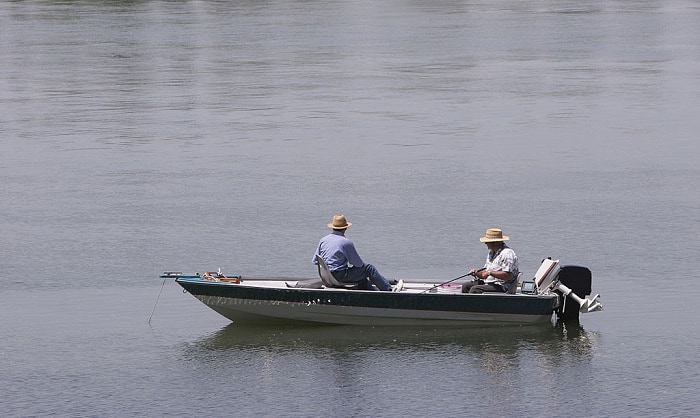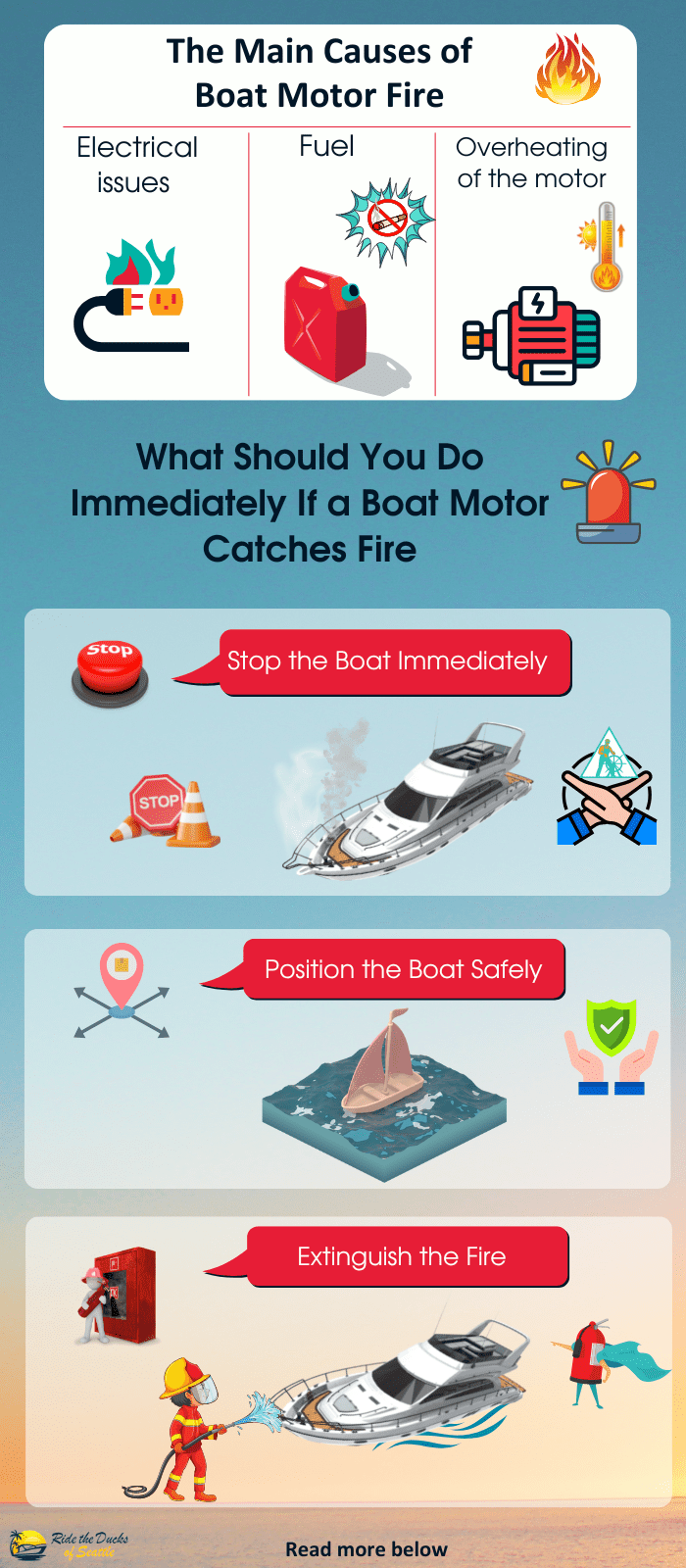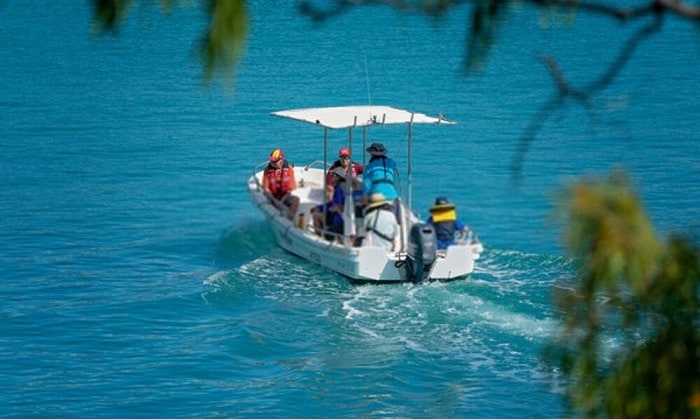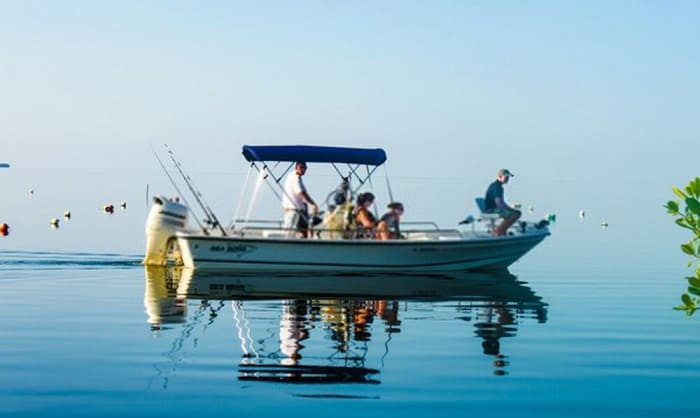The sun is out, the water is calm, and you are having a good time. All of a sudden, you hear an explosion and the engine is suddenly ablaze. What should you do immediately if a boat motor catches fire?
Stop the boat if it is moving. Otherwise, shut down the fuel line. Turn off any other electrical components that the fire can damage. Calm down all the passengers, set them in a safe position, and use a fire extinguisher to put the flames out. Consider preventive measures as well, such as maintaining the motor.
Continue reading to learn more about how to deal with boat motor fires. Stay alert and you can save both your boat and the people on it.
Table of Contents
The Main Causes of Boat Motor Fire
Electrical issues are the most common causes of boat motor fires. When there is something wrong with the electrical connections and ignition sources, a fire is likely to occur.
Another main cause is fuel. It is flammable, and hence, a hazard onboard. Keep the fuel tank closed. Avoid smoking near the fuel tank and keep it away from other potential sources of fire. Store any spare fuel in dark and dry places as well.
Overheating of the motor is another potential culprit. This is more common when the weather is extremely hot or when the boat is venturing through harsh environments. Proper maintenance is the easiest way to prevent this from happening.
Motor damage is also to blame. If the motor is old, fires are more common.
What Should You Do Immediately
Stop the Boat Immediately
If the boat is still running when the motor catches fire, the first thing to do is to stop it. If there is heavy damage to the engine, it will stop by itself. Otherwise, you need to manually halt the operation to prevent the flames from worsening.
Turn off the engine at the first sign of fire. Do the same thing on the fuel line, electrical connections, gas pipes, and other things that can potentially ignite.
Position the Boat Safely
Alertness is a luxury most people do not have in emergencies. Nonetheless, it is crucial to be as attentive as possible. Keep the boat somewhere it is safe and easy to evacuate passengers. Assess the environment to decide where you should be heading.
One of the most important things to remember is to keep the boat away from the direction of the wind. Otherwise, the wind will spread the blaze, widening the scope of the fire.
Extinguish the Fire
The US Coast Guard requires at least one marine fire extinguisher onboard. For boats 26 to 40 feet in length, however, you need at least two. It is a lifesaver in unexpected situations.
A mistake most people make is removing the cover of the motor before aiming the fire extinguisher. This will result in a bigger problem. Smoke will come out and engulf you, making it harder to act.
How to Choose a Fire Extinguisher
Not all fire extinguishers are the same. The one you have at home may not be right for your boat. The most important consideration is the classification of the fire extinguisher. Class A is for combustible solids and Class B is for flammable liquids. Class C is for electrical fires and Class D is for flammable metals.
Gas fires are the most common in a boat, so the law often requires a Class B fire extinguisher. For your peace of mind, we recommend one that fights all types of fires. If that’s the case, consider Kidde FA Multi-Purpose Fire Extinguisher.
Using a Fire Extinguisher
It is not enough to just have a fire extinguisher in your boat. It is useless if you do not know how to use it properly. Watch the short video below for a quick guide on how to put out a fire with a fire extinguisher.
The most important takeaway from the video is to be courageous enough to set off the fire and stay calm. Once you are ready, pull the pin, aim at the fire, squeeze the handles, and sweep, making sure that it covers the fire on the motor.
Always reach for the fire extinguisher instead of throwing water on the flaming motor. Especially when there are electrical components, the water can result in electrocution, resulting in another problem.
Care and Maintenance
Through the years, fire extinguishers are prone to problems. To ensure peak performance, pay attention to proper maintenance, especially storage. Always check the gauge, making sure it has a charge. Check that the seals are not broken and that the hose has no cracks.
Prevention is Better than Cure
Prevention is better than cure. So, take the time to ensure that the motor is well-maintained. Before running the boat, inspect the engine and fix any issue as soon as possible to prevent it from turning into a fire hazard.
To maintain the boat motor and prevent fires, inspect the wirings. Avoid having loose connections and replace wires with visible damages. Remove debris from intake lines in addition to getting rid of blockages in the exhaust manifolds.
It is also a good idea to have smoke alarms and carbon monoxide detectors, particularly near the engine. This way, you will immediately hear a warning when there is smoke or blaze, and you can act in an instant.
Installing an automatic fire extinguisher is a good preventive measure as well. It atomically activates once it detects a fire, so you can be more proactive in dealing with the unexpected. It smothers the blaze before it causes panic.
Conclusion
Most fires on the boat start in the engine room. From electrical wiring to transmission overheating, there are many culprits for boat motor fires. Regardless of the reason, the most important is to stay calm and deal with the problem head-on before it escalates.
As soon as you see fire on the motor, stop the boat, and turn off the engine. Position it away from the wind and use a fire extinguisher. One of the best products to have on your boat is Kidde FA Multi-Purpose Fire Extinguisher, which can save your boat and your life.
Did you enjoy this guide on what should you do immediately if a boat motor catches fire? Let us know in the comment box below. We look forward to hearing from you.

I am passionate about water sports and technical fields, so combining both makes me interested in making contents about boat accessories. With my partner, we went on many trips and sports games together, which led us to think about how we can spread our joys and passions to many people.




